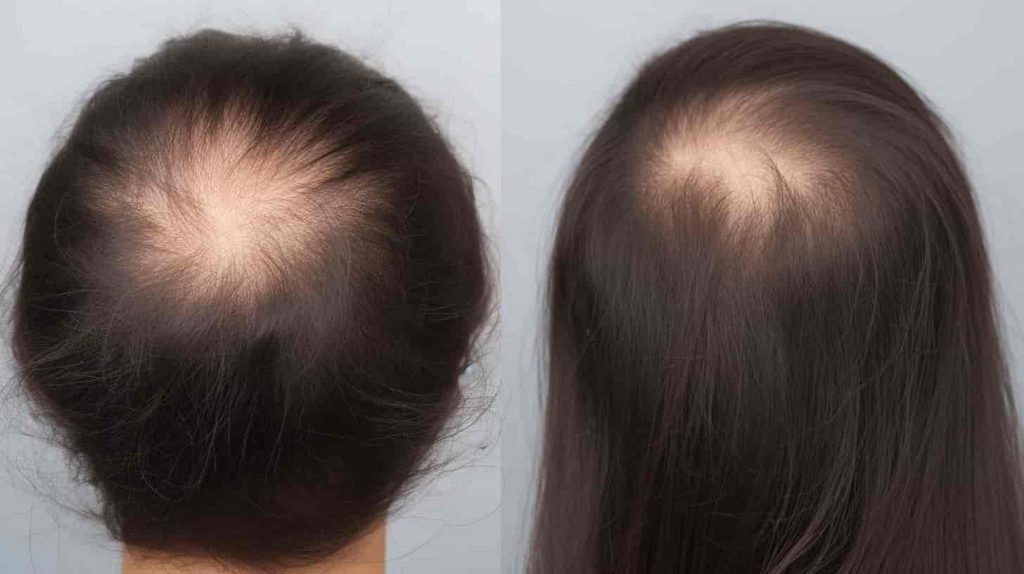Reviewed on: November 8, 2024
Ever feel like Alopecia Areata is playing a game of hide and seek with your hair? And let's be real, it's not the fun kind. You've probably stumbled upon countless "Alopecia Areata Treatments" during your late-night scrolls, but which ones are the real deal? 🤔 This article is like your flashlight in this game, highlighting medical interventions, unearthing natural remedies, and spotlighting the effects of lifestyle shifts. Plus, we'll dive into the latest research that's making waves. So, are you ready to decode the mysteries of Alopecia Areata treatments with me? Let's separate the myths from the miracles together! 🕵️♂️✨
Table of Contents

Understanding Alopecia Areata: Causes and Symptoms
You've got to understand what causes Alopecia Areata and its symptoms before you can effectively tackle its treatment. At the root of it, Alopecia Areata is an autoimmune disorder. In this case, your body's immune system mistakenly attacks healthy hair follicles, causing them to shrink and slow down hair production. But why does this happen?
One major factor is genetic predisposition. If you have family members with the condition, there's a higher chance that you might develop it, too. It doesn't mean you'll get it, but your odds increase.
Then there's the stress link. While stress isn't a direct cause of Alopecia Areata, many experts believe it can trigger or worsen the condition in those genetically predisposed. Stressful events can prompt an autoimmune response, leading to sudden hair loss.
Symptoms are typically straightforward: patchy hair loss is common, usually starting with one or two spots on the scalp. You may also notice changes in your nails, like dents or white spots.
Understanding these factors gives us valuable insight into possible treatment strategies - from managing stress levels to targeting the immune response directly.
Medical Treatments for Alopecia Areata: Successes and Limitations
Medical interventions for this hair loss condition have their pros and cons. It's important to weigh these before deciding on your best action.
Drug efficacy in treating alopecia areata varies greatly. Corticosteroids, either topically applied or injected, can stimulate hair growth by suppressing the immune response that causes hair loss. However, they're not always effective and don't prevent future episodes of hair loss.
Minoxidil, another drug option, is more commonly used for pattern baldness but can also help in alopecia areata treatment. Its effectiveness differs from person to person.
Treatment side effects are a significant concern, too. Corticosteroids may cause skin irritation or changes in complexion, while minoxidil could lead to unwanted facial hair growth in women.
Immunotherapy advancements provide hope, though. Scientists are studying new drugs targeting specific parts of your immune system, which might offer better solutions with fewer side effects. They're also researching gene therapy as a potential long-term solution.
Remember: each treatment has its limitations, and success is never guaranteed. What works for one person might not work for another due to genetic differences and varying disease severity levels. Always consult with your healthcare provider before starting any new treatment regimen.
Natural Remedies: Promising or Placebo
Switching gears, let's delve into the world of natural remedies for hair loss and whether they're truly promising or just a placebo effect.
You've probably heard about various herbal treatments boasting effectiveness against alopecia areata. But what does science say? Certain herbs like ginseng and saw palmetto have shown the potential to boost hair growth by inhibiting 5-alpha reductase, an enzyme linked to hair loss.
Now, onto homeopathy evaluation. Despite anecdotal success stories, scientific evidence supporting homeopathy as a reliable treatment for hair loss is minimal at best. Most studies lack rigorous methodology or show no significant difference from placebos. It's crucial not to pin all your hopes on these treatments without robust clinical backing.
Lastly, let's tackle the dietary impact on hair health. Nutrient deficiencies—particularly iron, zinc, and biotin—can contribute to hair loss. Conversely, balanced diets rich in these nutrients may improve it but won't necessarily reverse alopecia areata.
In conclusion, While some natural remedies might help support overall scalp health and slow down hair-thinning processes, they aren't proven cures for alopecia areata. Always consult with a healthcare professional before embarking on any treatment journey.

The Impact of Lifestyle Changes on Alopecia Areata
Beyond diet, let's consider how other lifestyle changes might influence hair loss. The dietary influence on alopecia areata is significant, but there's more to the puzzle. Stress management and exercise effects also play a substantial role in mitigating or exacerbating this condition.
When you're under stress, your body produces hormones that can disrupt the natural hair growth cycle and rest. This disruption often leads to accelerated hair shedding or even bald patches. So, incorporating effective stress management techniques into your routine—like regular mindfulness meditation or yoga—can help maintain hormonal balance and potentially slow down the progression of alopecia areata.
Exercise offers dual benefits: it reduces stress hormone levels while promoting overall circulation, including blood flow to your scalp and nourishing your hair follicles. Regular physical activity like brisk walking or cycling can support healthier hair growth by improving follicular health.
Remember, though, these lifestyle modifications aren't quick fixes. They require time and consistency for noticeable effects. It's also crucial to understand that while they can aid in managing symptoms, they don't replace medical treatments professionals prescribe for alopecia areata.

Cutting-Edge Research: Future Possibilities for Alopecia Areata Treatment
You'll be fascinated to hear about the latest research paving the way for future possibilities in managing hair loss conditions.
Advancements are being made in gene therapy potential, stem cell advancements, and immunosuppressant developments.
Gene therapy is a cutting-edge approach showing enormous potential. By manipulating your genetic makeup, it's possible that we could unlock new treatments for alopecia areata. Scientists aim to target genes responsible for hair growth and alteration, potentially eradicating the condition at its root cause.
Stem cell advancements also hold promise. Your body's regenerative capabilities might be boosted by injecting carefully cultivated stem cells into affected scalp areas. This could stimulate hair follicle production, leading to renewed growth.
Immunosuppressant developments are another field of interest. As alopecia areata is an autoimmune disorder where your immune system mistakenly attacks hair follicles, suppressing this response could alleviate symptoms. Newer drugs with fewer side effects are being explored to manage this aspect effectively.
It's an exciting time in medical science where groundbreaking research pushes boundaries and brings us closer to more effective solutions for those struggling with alopecia areata.
Frequently Asked Questions
What Are the Psychological Impacts of Alopecia Areata?
Alopecia areata can significantly impact your mental health. It often triggers anxiety, heightens depression symptoms, and creates self-esteem issues due to sudden, unpredictable hair loss and societal beauty standards.
How Does Alopecia Areata Affect a Person's Social Life and Relationships?
Alopecia areata can impact your dating experiences and self-image perceptions, leading to difficulties in social situations. You may face social stigmas, causing strain on relationships due to misunderstandings about the condition.
How Can I Explain Alopecia Areata to My Children or Other Family Members?
You've got to explain alopecia areata in simple terms. Say it's a condition causing hair loss, not contagious or painful. Expect varied reactions from kids, but assure them you're the same person inside.
Are There Any Support Groups or Communities for People With Alopecia Areata?
There are numerous online resources and support groups for people with alopecia areata. They offer peer counseling, advice on lifestyle adaptations, and a community to share experiences and coping strategies.
How Does Alopecia Areata Impact a Person's Career or Professional Life?
Alopecia areata can affect your career in several ways. You might need career adjustments, face workplace discrimination, or feel it impacts your professional image. Yet, you're just as capable and deserving of success.
References:
Alopecia areata: A review on the diagnosis, immunological etiopathogenesis, and treatment options
Links:
A Comprehensive Guide to Hair Loss: Causes and Treatments
Illnesses That Cause Hair Loss in Females: Uncovering the Hidden Health Culprits

